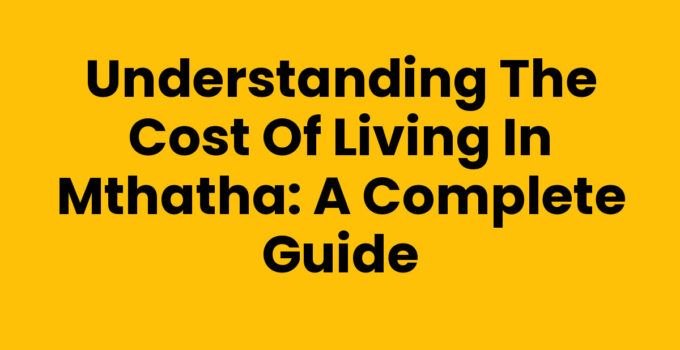Mthatha, a vibrant town in the Eastern Cape of South Africa, has been gaining attention for its rich culture and history. As more individuals contemplate relocating or visiting this town, a key consideration emerges: the cost of living in Mthatha. Understanding this aspect is crucial for budgeting, lifestyle adjustments, and determining whether it suits your financial plans. In this blog, we’ll delve into various elements that make up the cost of living in Mthatha, including housing, transportation, groceries, healthcare, and leisure activities.
Cost Of Living In Mthatha: A Detailed Breakdown
To adequately understand the cost of living in Mthatha, we need to break it down into essential categories:
1. Housing Costs
Housing generally constitutes the most significant portion of monthly expenses. In Mthatha, the housing costs can vary widely depending on location and type of accommodation. On average, rent for a one-bedroom apartment in the city center is around R4,000, while you might find slightly lower rates of about R3,000 in suburban areas. If you are considering purchasing property, the average price for a three-bedroom house can be about R900,000.
2. Transportation
Transportation costs in Mthatha are relatively affordable compared to many urban areas in South Africa. Public transport options include taxis, which can range from R10 to R30 per trip, depending on the distance. If you drive, petrol costs hover around R20 per liter. Monthly public transport fares can go up to R600, which is reasonable for regular commuters.
3. Grocery Expenses
Next, let’s examine grocery costs, which are another critical aspect of living expenses. Mthatha’s grocery prices are in line with national averages. A basic grocery basket for one person may cost around R2,000 monthly. Key items typically purchased include:
- Bread: R15
- Milk (1 liter): R15
- Eggs (12): R30
- Chicken fillets (1 kg): R80
- Rice (1 kg): R30
By being strategic with your purchasing, you can find good deals, especially if you shop at local markets.
4. Healthcare and Insurance Costs
Healthcare is a significant concern for many individuals. In Mthatha, public healthcare services are available, but private healthcare options also exist, typically resulting in quicker and more comprehensive care. A standard consultation with a general practitioner usually costs around R400. Health insurance could be a worthwhile investment, with rates depending on coverage options and providers. Basic cover could start at R1,000 per month.
5. Leisure Activities and Entertainment
Mthatha offers various entertainment and leisure options at relatively low prices. Movie tickets usually cost around R80, while dining out can range from R80 for a casual meal to R200 for a mid-range restaurant. Parks and outdoor activities provide free recreational opportunities, encouraging a balanced lifestyle.
Read Also: Explore Wsu Mthatha Postgraduate Studies for a Brighter Future
Pros and Cons of Living in Mthatha
Before making a move, it’s essential to weigh the pros and cons of living in Mthatha.
Pros:
- Affordability: The cost of living is relatively low.
- Cultural Richness: Mthatha is steeped in history and culture.
- Community: A close-knit community with friendly residents.
Cons:
- Limited Job Opportunities: The job market can be challenging.
- Public Services: Some public services may lack efficiency.
Read Also: Get the Sars Mthatha Contact Number You Need Instantly
Conclusion
In conclusion, the cost of living in Mthatha offers both affordable housing and accessible day-to-day expenses, making it an attractive option for many. Understanding the detailed categories of costs helps individuals make informed decisions about their living arrangements. Always consider personal preferences and adjust your budget accordingly.
You Might Also Like: Discover Nelson Mandela Academic Hospital, Mthatha: Services & Care
Frequently Asked Questions
What is the average monthly rent for an apartment in Mthatha?
The average monthly rent for a one-bedroom apartment in Mthatha is around R4,000.
Are groceries expensive in Mthatha?
Groceries in Mthatha are reasonably priced, with a basic basket costing about R2,000 monthly.
Is healthcare affordable in Mthatha?
Healthcare can be affordable, with general practitioner consultations averaging R400.









